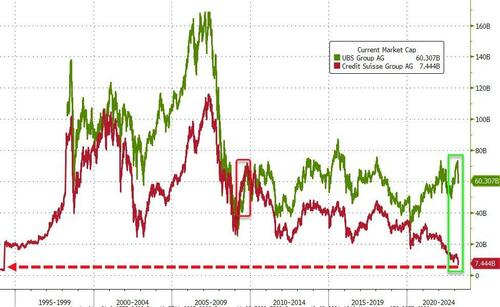mzkitty
I give up.
FJB needs to make sure his 10% is not affected.


That’s because they’re all liars.NBC's Chuck Todd outlines the economic woes under Biden:
Inflation "remains stubborn" as "prices continued to rise in February"
"Supply chain has been slow to recover"
"Millions dropped out of the workforce"
But I was told by Biden that "inflation would be transitory"
RT 30secs
View: https://twitter.com/Brick_Suit/status/1637469969431805952?t=9r3oV3KjGarJzqlWQm6JZA&s=19

And as was thoroughly discussed all along the way, we knew that zero interest was fatal. It was a seductive move with no way out. Grumble grumble.The dozen years of zero percent interest has screwed everyone, the public, the banks, and the corporations.
There is no fixing that now.
Whatever they tell us, double it for sure....Inflation is not 6%. My weekly grocery bills have doubled in price.
Yes. At leastInflation is not 6%. My weekly grocery bills have doubled in price.
Yes. At least

This was the calm-the-herd number to say that we have a real but manageable situation here. Don't you worry your pretty little head, we're on top of it. What the REAL situation is will become clear in the course of time. This feels big, really big.Banking regulators have been given evidence as many as 25 mid sized banks must be merged/face elimination because of balance sheet issues. Large banks would be natural buyers if govt relaxes deposit limits. By contrast 1200 banks went away during thrift crisis
How scary.This was the calm-the-herd number to say that we have a real but manageable situation here. Don't you worry your pretty little head, we're on top of it. What the REAL situation is will become clear in the course of time. This feels big, really big.

Finally, The Wall Street Journal reports that, in an effort to smooth the deal, the Swiss National Bank has offered UBS around $100 billion in liquidity to help it take on Credit Suisse’s operations, according to the people familiar with the matter. Details of the liquidity offer couldn’t be learned.“I can’t believe our members and UBS shareholders will be happy about this,” he said.
“I have never seen such measures taken; it shows how bad the situation is.”
 Photo: Getty Images
Photo: Getty Images

Might have to get some plant-based "meat" for a few of our burgers. All this ground beef is getting expensive...Will there be a fresh deathburger and doom thread tonight?
I don't know the numbers of banks or how many are on the brink. But it feels like we'll see a banking holiday in the near future. Be prepared to hunker down while the elephants stampede.How scary.
What do you think it truly is?
The Rothschild Banking system wins once again...basically.What does that mean?
Good question. I think it means a lot of people took a real shaving.What does that mean?
Good point...If you can, take some cash out now, a couple of weeks expenses in the event a "Holiday" goes into effect. At least you can buy food and gas...for a while.I don't know the numbers of banks or how many are on the brink. But it feels like we'll see a banking holiday in the near future. Be prepared to hunker down while the elephants stampede.
I think you’ve all convinced me.Good point...If you can, take some cash out now, a couple of weeks expenses in the event a "Holiday" goes into effect. At least you can buy food and gas...for a while.

You can always put it back in if you need to...but if you need to and dont you may not be able to take it out.I think you’ve all convinced me.
I’ve been trying to hold off doing the withdrawal thing.

Nah, we wouldn't spoil the sacredness of that song.So will we have an honest to goodness Deathburger thread tonight? Ya know, Photos and everything ?
It could be sheer chaos tonight...Groucho and /or Hammer might even play THAT song...they do not care what day of the week it is.
Yes....margins have been a bit thin ...hmmm....what to do, what to do?Nah, we wouldn't spoil the sacredness of that song.
Though we have been holding back certain pictures for when the markets really get interesting...
Well, it ain’t a double rainbow.What does that mean?
It means that the Swiss National Bank is going to:What does that mean?
I may have read it long ago, but I've thought it wise to keep enough "cash" on hand to handle a couple of months worth of normal spending. That way if banks and electronics weren't working correctly for a time, I can keep things covered. These glitches can be anything from rough weather like California is having right now, to earthquakes and other natural disasters right up to bank holidays and failures.I think you’ve all convinced me.
I’ve been trying to hold off doing the withdrawal thing.

Too big to fail becomes too big to bail.......
Nice, concise summary of the situation. Thank you!It means that the Swiss National Bank is going to:
1. Allow UBS to buy it for .50 per share.
2. Shareholders don't get to vote on it. You lose 75% of the value of your stock holding.
3. UBS provides a 100 billion dollar line of equity to support the deal (which UBS is paying 2 Billion). Wrap your head around it. They give them 100 billion to spend 2 billion. They expect a collapse of the 1.4 trillion in assets of CS even after the transfer.
4. If the credit default swaps, "insurance" rise too much the deal is off.
5. The initial plan was a "bail in". Bond holders get wiped out. The bonds are worth zero. Some may have convertible bonds which would be converted to stock which would drive the price down further, basically giving pennies on the dollar to those lucky few and nothing to the rest.
6. Holders of CS equity and bonds are going to have massive losses. That will cascade to other entities who now have to write down those holdings, who will fail and keeping the ball rolling.
7. Note the post above with reports that 25 mid sized banks need to be "acquired" by bigger banks. That number is closer to 300. Note also that yesterday 119 banks asked the FDIC to ensure everything for the next 2 years because their depositors are running to the too big to fail banks. We are in the top of the first inning here folks.
